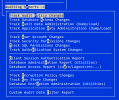We have a statutory requirement of Audit trail functionality in QAD. I am aware that there is a audit functionality in the standard QAD which can be activated. Based on few expert opinions I found that it is not advisable to activate this feature. The reason behind is it will generate lot of data which will be difficult to manage.
My questions as below.
1. Is the access through progress editor to the database can be audited or anyone who has some workaround.
2. What are the merits and de-merits of activating the Audit functionality in the system and will it suffice the question no. 1 above that is will it also create an audit log of the tasks done using progress editor.
3. There is one standard feature like "Master Table Audit Detail Report". This contains auditing feature for a certain tables only. Can we add tables into this feature and if yes then how to .
Forum's views / suggestions are appreciated .
Thanks & Regards
Cyrus Sethna
My questions as below.
1. Is the access through progress editor to the database can be audited or anyone who has some workaround.
2. What are the merits and de-merits of activating the Audit functionality in the system and will it suffice the question no. 1 above that is will it also create an audit log of the tasks done using progress editor.
3. There is one standard feature like "Master Table Audit Detail Report". This contains auditing feature for a certain tables only. Can we add tables into this feature and if yes then how to .
Forum's views / suggestions are appreciated .
Thanks & Regards
Cyrus Sethna

